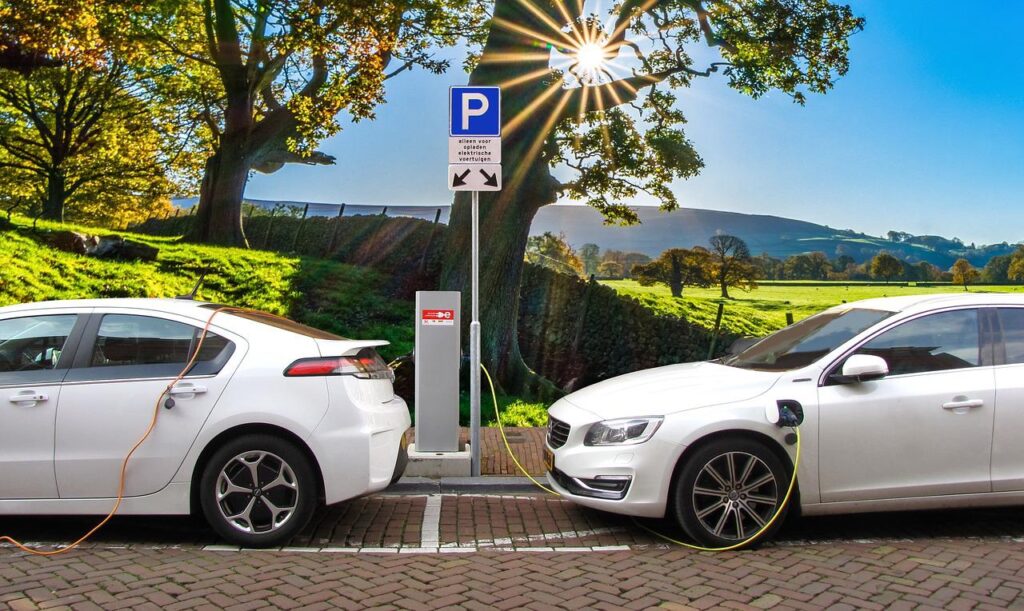Pros & Cons Of Electric Vehicle Ownership: Should You Buy One?
With EVs becoming more popular, it's more pertinent than ever to consider if electric vehicle ownership is right for you.
This article is more than 2 years old

Electric vehicle ownership has been increasing exponentially in recent years. By the year 2030, electric vehicles are expected to comprise about 32% of all vehicles on the road. That percentage is supposed to increase to 45% by 2035. Alongside this increased adoption comes major climate-forward initiatives, many of which were outlined in the Biden Administration’s recent climate-focused bill. Also, in accordance with all of the forward momentum surrounding electric vehicle ownership, California’s government just announced a historic maneuver. The state has asserted its intentions to outlaw the sale of all new gas-powered cars by 2035.
While it is exciting to finally see some visible action pertaining to taking care of the one and only Earth on which we all as a global populace reside, it’s important to realize that electric vehicle ownership does not come without its fair share of pitfalls. As with everything, there are many pros and cons that go along with owning an electric vehicle. That is especially true now because the United States is still overwhelmingly suited to supporting cars with internal combustion engines. Thus, we thought it pertinent to examine both the pros and cons that go along with electric vehicle ownership with the goal of determining the practicality of owning them at present. Read on to discover if you happen to be one who should own an electric vehicle right now.
ELECTRIC VEHICLE OWNERSHIP: THE PROS
With so many people opting into electric vehicle ownership, there obviously have to be some considerable pros that lured them in that direction. Let’s start with the most obvious advantage: electric vehicles don’t produce any emissions. This does a great service to the environment. Hence, it’s inherent that environmentally conscious and concerned folk would gravitate toward’s electric vehicle ownership. However, there are a whole host of other benefits that exist apart from the immediately obvious.
MORE EFFICIENT AND LESS MAINTENANCE
Electric cars are far better at converting energy than those powered by gasoline. According to the United States Department of Energy, on average gas-powered cars are only able to convert between 12-30% of the energy stored in gasoline. Conversely, EVs are able to convert about 77% of their stored electric energy. This means that as EV designs continue to improve, they will be able to outpace even the most fuel-efficient ICE engines. Today, new EVs can typically go between 200-300 miles on a single charge. In the coming years, ranges are expected to measurably increase.
Another advantage that electric vehicles have over ones powered by gasoline is the fact that they have to go for maintenance far less frequently. This is because electric car engines are not as intricate as ICE ones. Additionally, electric cars do not require oil changes. And they don’t need spark plugs or filter replacements. Also, because EVs use resistance from the engine as a part of their braking systems, brake pads don’t have to be replaced as often as traditional motor vehicles. Overall, in a typical year, owners of electric vehicles can be expected to pay about $330 less in maintenance costs compared to those with ICE counterparts.
QUIET
Electric engines are innately quiet. Thus, electric vehicles are naturally much quieter than those with internal combustion engines. While some individuals might prefer the sound of a revving engine ( Chevy is aiming to replicate that sound with its electric muscle cars), there is something very appealing about driving in a super quiet cabin.
On a grander scale, roads that are dominated by electric cars will produce far less noise pollution than the roads full of ICE cars do now. Think about how much more peaceful it could be to walk city streets and actually hear the sounds of birds chirping instead of the incessant hum of car engines. There would also be far less need for unsightly sound barriers on highways. How nice would it be for those in highly populated areas to become reattuned to the natural sounds that have long been muted by the country’s dependence on gas-powered cars? Although to be fair, that’s not to say that honking horns and road rage will go the way the dodo along with engine noise.
PERFORMANCE AND DIVERSIFYING MARKET APPEAL
As much as traditional car enthusiasts would hate to admit, electric vehicles have the capacity to perform pretty impressively on the road. Top performing EVs can easily compete with the likes of many cars powered by internal combustion engines. A notable example is the Tesla Model S Plaid, which reportedly has the capability to go from 0-60 mph in under 2 seconds. Even less performance-focused models that would appeal more to the average individual are still exceedingly peppy. For instance, the Hyundai Ioniq 5 SE can hit 60 mph in 5 seconds or less. Rivian’s R1T truck and R1S SUV can hit 60 in 3 seconds or less.
Additionally, with those in the market for electric vehicles consistently increasing, so too are the types of electric vehicles that are available. Auto giants like Ford, Honda, and Toyota have all outlined their plans to add multiple types of EVs to their lineups in the coming years. The launch of Ford’s F-150 Lightning is one such addition that has served to accelerate interest in electric vehicle ownership. Unlike Tesla’s sleek and high-end cars, the F-150 Lighting is designed to appeal to traditional F-150 drivers. It is a workhorse and is built with those who use them as such in mind. Nick Schmidt, a farmer in rural Michigan, is one individual who purchased the F-150 Lighting for exactly that purpose.
ELECTRIC VEHICLE OWNERSHIP: THE CONS
For as many pros can be garnered from electric vehicle ownership, there still are considerable cons worth examining. From charging obstacles to unforeseen environmental impacts, electric vehicles are far from perfect. Many of these detractors are what still make electric vehicle ownership impractical for many United States citizens.
CHARGING INFRASTRUCTURE AND RANGE ANXIETY
Perhaps the largest con is the state of the charging infrastructure in the United States. It’s utterly abysmal. Outside of major metropolitan areas, accessible chargers for electric vehicles are few and far between. Rachel Wolfe, a reporter from the Wall Street Journal, discovered this firsthand when she chronicled her journey from New Orleans to Chicago and all of the heartache and inconvenience that went along with it.
Her trip not only required significantly more planning (to account for range and charger locations) and took far longer than the same trip would have taken in a gas-powered car, but along the way, many of the places with chargers that she planned to stop at just did not work. This is just not acceptable. Her experience is enough to stop almost anyone from jumping headfirst into electric car ownership.
Thankfully, the recent bill set into motion by the Biden Administration aims to directly address these deficits. However, until that happens in any sort of measurable sense, electric car ownership overall will still be plagued by an insufficient number of chargers that contribute to range anxiety, ultimately hindering practicality for many.
EXTREME TEMPERATURES
Extreme temperatures significantly affect electric vehicle battery performance. Someone looking into electric vehicle ownership surely wants to have a consistent and reliable car. However, this is uncertain if said individual happens to live in an area prone to experiencing extremely hot or cold temperatures. Watch the video below to get a full picture of how extreme temperatures can impact battery performance.
REPLACEMENT BATTERIES
If the battery that powers an electric vehicle needs replacing it’s going to cost you. And it’s going to cost you a pretty penny if the car’s battery is not covered under warranty by its manufacturer. Typically, a replacement battery will run an individual between $4,000 and $5,500. However, certain batteries can exceed that cost. For instance, a Chevy Bolt with 66 kWh battery costs around $16,000 to replace. On top of the replacement cost, labor and installation charges will also be added. These range from $1,000 to $5,000. Worst case scenario, one might have to pay over $20,000 to replace a battery. This could be a serious detractor for many.
LITHIUM-ION BATTERIES
Lithium-ion batteries are the batteries that are used to power electric vehicles. And while electric vehicles themselves, are significantly better for the environment, mining for the lithium in the batteries used to power them is not. Mining lithium is an extremely destructive process. Depending on the method used, the mining process could cause soil salinization, soil erosion, landslides, and/or toxic pollutants to be released into the air. An immense amount of water is also used in lithium mining. This is not only a bad thing because much of the world is or will soon be facing a water crisis, but there is also a chance that those pollutants could end up as vapor particles in the water supply.
Lithium mining is not done in the United States, however, it would be negligent (and downright cruel for that matter) not to consider the impact that this process is having and will continue to have in other parts of the world. Thankfully, there are many viable lithium-ion battery alternatives that can be used instead. It’s just a matter of getting more companies to adopt and develop these alternatives. However, considering how long it’s taken electric cars to begin to tap into the mainstream, replacing what is known to work is going to be far easier said than done.
COST
The upfront cost of electric vehicles, while still a con, is steadily improving. At the lower end, there is currently the Nissan Leaf, Mini Cooper Electric Hardtop, and the Chevrolet Bolt. The base prices for these vehicles are $27,400, $29,900, and $31,500, respectively for the 2022 model year. By comparison, the average price for a new gas-powered car purchased in 2021 rang up at around $46,000. Considering these facts, it is clear that electric vehicles are starting to get cheaper and align more with lower-end gas-powered cars. This is great! This is what needs to happen for more people to consider electric vehicle ownership. However, the EV market on the lower end is still seriously lacking in options. With only three cars coming in at under $40,000 that is still not a lot of choice for prospective consumers. The options only become far more vast and varied as you climb the price ladder. This needs to change to entice more people to consider purchasing an EV.
THE CONCLUSION
Judging by the pros and cons it’s abundantly clear that electric vehicle ownership is not yet something every United States resident should consider. That is not until the charging infrastructure has been greatly expanded and more affordable options become readily available. That being said, for some, electric vehicle ownership can be a practical choice. If you happen to live in a city or a city suburb where EV charging is readily accessible and reliable, investing in an EV is not a bad idea. It’s an even better idea if you don’t see yourself leaving your city bubble too often. Also, gas in major metropolitan areas is often more inflated because of innately higher demand. Owning an electric car would eliminate this expenditure altogether. Overall though, while there is certainly a growing market where electric vehicle ownership is a viable choice there is still a long way to go and many hurdles to overcome before owning one becomes practical for the masses. That being said, for me personally, as soon as I am in a position to do so, I have my sights firmly set on purchasing a Rivian R1S.




